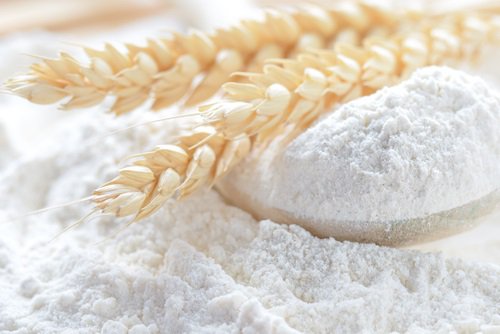75% of the prepared or processed foods we eat daily contain flour. And it’s no wonder – its high fiber content, vitamin A, B1, B5, C, E, and K make it an ideal food. However, most of the flour used is refined and this is when it can become a harmful food for the body, since it loses all of its properties. Knowing this, if you have asked yourself, “what happens in your body if you stop eating flour?”, below you will find the answers.

What happens if you stop eating flour
Excessive consumption of refined foods is related to ailments and disorders including serious diseases, like cancer. Refined flour mainly can cause problems from hypertension, mucous and phlegm and even diabetes as a result of the process the grains go through, resulting in a compound called “alloxan”, which is very harmful and curiously the main compound in breads. You can learn more about this subject reading the 5 white poisons that you eat ever day.
Cravings disappear and your body weight normalizes
Wheat flour contains a property called gliadin which is responsible for carrying a signal to the brain that stimulates appetite. On the other hand, it’s good to remember that the refined flour used in foods tends to have high levels of sugar; this effect increases blood sugar and thus immediately triggers appetite. Specifically, if you stop eating flour you can lose weight and keep it under control if you want.
Your metabolism speeds up
A laboratory study on animals did an experiment which consisted of feeding one group refined flour and whole wheat flour to the other. When finished, they discovered that both groups had a similar weight, but the group that ate the white flour had a slower metabolism and increased blood sugar.
The conclusion of the study therefore was that if you stop consuming flour, your metabolism will increase and your blood sugar will decrease. In other words, digestion is faster and increase in blood pressure is almost nonexistent.
You avoid intestinal disorders

Flour contains a component called lecithin, which provokes inflammation in the lining of the intestine and creates fissures between cells. Refined or processed flour tends to lose up to 80% of its fiber, and without this component you end up eating fast-releasing carbohydrates, which in short is harmful for your stomach.
Control your cholesterol levels
If you stop eating flour, the cholesterol that circulates through your body stays at low levels. This effect is beneficial for the body since it prevents heart diseases such as heart attacks or those terrifying accidents known as strokes. But that’s not all – the LDL cholesterol (known as bad cholesterol) remains at low levels and the good (HDL) predominates.
Your pH will balance
The body carefully maintains an internal pH balance, and any disturbance that changes it can have mild or serious consequences. The normal pH of the body is 7.4, but what does that have to do with flour? Well, it turns out that eating it practically forces the body to lose calcium from your bones to maintain the balance.
As a result, the chances of suffering from osteoporosis increase. Basically, the bones degenerate, lose their density and fractures occur more often. Avoiding refined flour is one of the steps to counter this effect.
So I should stop eating it?
Refined or processed flour should disappear from your diet. As we mentioned, the process that they undergo eliminates the majority of their fiber and minerals which is dangerous for the body. Whole wheat flour, in contrast, retains all of its properties that benefit digestions and metabolism.
Along with this recommendation we can say that the amount you eat is important. If you suddenly stop eating whole wheat flour, your intestinal flora will be negatively affected, your weight will decrease and your bones will degenerate faster. In short, quitting it altogether is almost impossible; there are too many foods that contain it. But this is where diets based on other factors come in, many of which you can find here.
